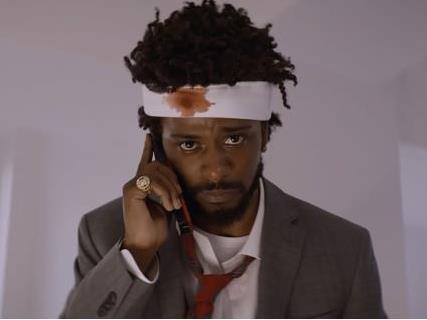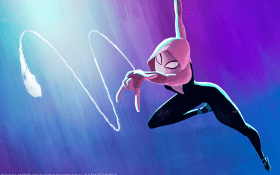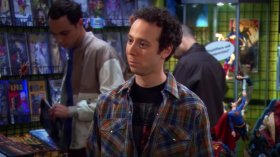Image: It’s a blood-bath in the telemarketing department. Source: NBC Universal.
Sorry to Bother You feels like it’s been a long time coming. Partly that’s because it’s writer-director Boots Riley’s first film, and like a lot of first films it has a lifetime’s worth of ideas bursting out across the screen. There’s at least three different films smashed together here, and if taking things a little slower might have given some ideas room to breathe, it’s this film’s breathless energy that helps get others over the line.
But it’s timely because this is a film with a message about capitalism and exploitation and how racism serves them in ways that reinforce their power. And even that’s only part of what’s happening here. It’s an over-the-top science fiction saga with a pro-union message, a relationship drama that takes a solid swipe at modern art, a workplace comedy where Danny “Lethal Weapon” Glover almost gets to say “I’m too old for this shit” with a bunch of stoner jokes thrown on top. When you have Armie Hammer playing a possibly insane billionaire who gets to say “we will do no line before it’s time” as he makes perhaps the craziest job offer in cinematic history, you know you’re watching something special.
Cassius (Lakeith Stanfield) needs a job, and when he aces the interview at a telemarketing business – well, he shows up with a bunch of fake references and a bogus sports trophy but it turns out they’ll literally hire anyone – it seems he’ll finally be able to start paying rent on the garage he’s currently living in. But initially he struggles, and it’s not until a co-worker (Glover) advises him to use his “white voice” (dubbed by comedian David Cross) that Cassius (often known as “Cash”) starts to make sales.
Unfortunately his rising status comes just as the office starts to unionise, leaving Cash torn. Should he stick with his fellow workers, who now include his artist girlfriend Detroit (Tessa Thompson), or let his success carry him away via the golden elevator reserved for the company’s elite “power sellers”? Even if that means he ends up selling WorryFree, a scheme that’s basically a new form of indentured servitude?
That synopsis barely scrapes the surface of this dystopian version of Oakland; this film has twists nobody could see coming. This energy is the film’s biggest strength. It’s constantly throwing diversions and jokes at the screen even when the plot stalls out and the characters are left treading water. There’s so much going on that many of the more promising ideas are cut short, but it’s probably worth it; while a more focused film might have been more successful at selling a blunt message, it wouldn’t be half as savage an overall indictment of capitalist America.
As the film’s everyman lead, Stanfield (best known from Atlanta and Get Out) has a big job anchoring us through this whirlwind. Thankfully his good-natured, gradually escalating disbelief at his ever-changing situation provides some much-needed consistency for the absurdity to work against. The supporting cast barely register even as one-off jokes, but Stanfield consistently supplies a grounded presence throughout the film’s increasingly outlandish events. He’s the personal touch in a film that in its eagerness to make its case, occasionally – and sometimes explicitly – seems happy to remove humanity from the equation.
|
4 stars
|
★★★★
|
Actors:
Director:
Format:
Country:
Release:





